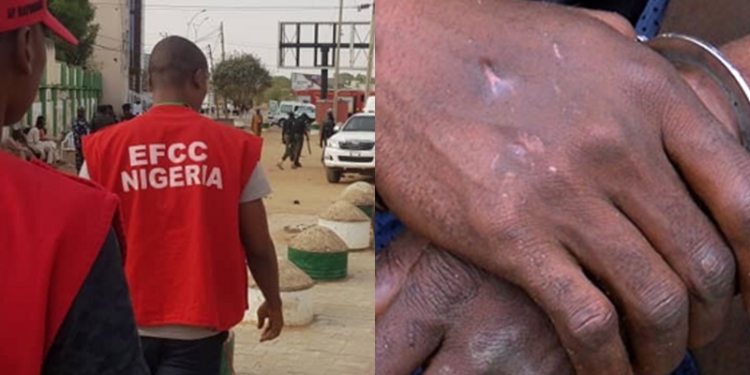The Economic and Financial Crimes Commission said it has traced N223million in illicit transactions in the bank account of the arrested Ekiti-based internet fraud kingpin, Ajayi Gbenga Festus.
The Ibadan Zonal Head of the anti-graft agency, Mr Friday Ebelo made the disclosure on Wednesday during a press conference at its Iyaganku, Ibadan zonal office.
He said Festus was working in cahoot with other cybercriminals abroad, in what Ebelo described as highly sophisticated web of a conspiracy designed to illegally access accounts of individuals and organisations to defraud them of their money.
He said illicit transactions made through Festus’ Nigerian bank accounts amounted to N223million, noting that the suspect serves as a conduit pipe through which proceeds of crime reach members of the syndicate.
Ebelo used the opportunity of the press briefing to advises the 80 Nigerians indicted by the FBI in massive cybercrime cases to come out of their hiding and clear their names before EFCC operatives get to them.
He said its operatives will arrest those within Nigeria, adding that the operatives have begun a background check on the suspects.
Ebelo said since the beginning of the year, the Ibadan Zonal office of EFCC arrested 263 suspects for cybercrime related offences out of which 111 had been convicted and sentenced to various jail terms.
The zone also recovered money, including landed properties, vehicles, laptops, phones and many others from the scammers.
Ebelo put the recovered monies at N7,461,378, US$56,452; 400 Canadian Dollars, 65 Pounds and 2,400 Euros, noting that the EFCC is in constant collaboration with international organisations with a similar mandate, especially the FBI in efforts to curb internet crimes and illicit funds transfer.
On Tuesday, the EFCC acting chairman, Ibrahim Magu also disclosed that the collaboration between the Commission and the Federal Bureau of Investigation, FBI, has led to the recovery by the Lagos office of $314,000 and about N373 million from internet scammers.
“Nine of the suspects are currently undergoing trial, while five are still under investigations.
“Over 80 cases are still under investigation from the EFCC-FBI joint operations,” Magu said.






Discussion about this post